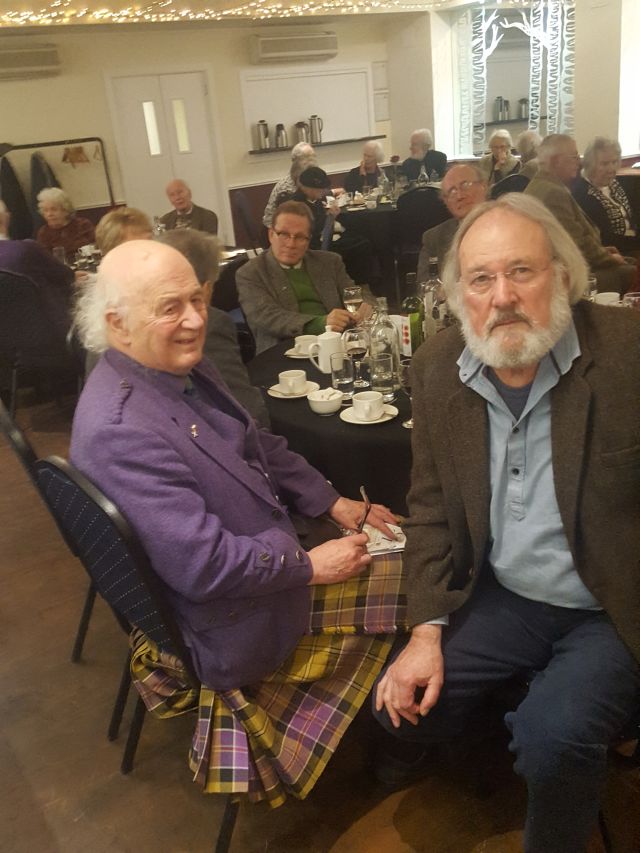Timothy Neat on Hamish Henderson As The Poets Knew Him

In Henderson's view Scotland hated and feared its creative writers. Why was there here this conspiracy of the old against the young, which with us was so blatantly tyrannical? It went back to the fantastic elite tyranny of the 17th century and the attempt to divide the nation into a small elect elite and the damned mass : there was an artistic elite and there was folk culture. But Christ died for all men and Scots literature arose out of the whole people.
The common folk and the poets recognised Hamish, but it was the wider Scottish persona that found him wanting. As a man and a poet he was committed to nurturing, touching, changing a Scotland devastated by the Great War and Great Depression, braced by great pride, empire, education and a deep sense of service. Scotland's motto Wha Daur Meddle Wi' Me framed well the forces of national continuance but assumed ignorance of the poetic, the spiritual, the intimate. It was with the Scots people that Hamish wished to speak, and the best way to do this was to build on Scotland's folk-cultural heritage. The poets he admired most were those who married the oral and literary traditions.
Anyone seeking to move in such company risked being cut down to size, and he knew that most of Scotland's major artists suffered exile in one form or another. He allied natural authority with a charismatic genius that ensured loyal and gifted friends gathered recurrently round him. He fed them, they fed him, and amongst them the poets understood him, at the deepest level, best. Most recognised shamanic forces in Hamish, forces both inspiring and fearsome. His Prologue to Elegies for the Dead in Cyrenaica concluded : Let my words knit what we now lack/the demon and the heritage/and fancy strapped to logic's rock/A chastened wantonness, a bit/that sets on song a discipline/a sensuous austerity.
Hamish was a force of nature - with a Christ-like sense of responsibility for the world beyond his own skin. He loved many individuals, he loved Scotland, he loved mankind. He was a child prodigy. All the schools he attended found themselves experiencing "renaissances". At Cambridge he got himself appointed stage manager at the Arts Theatre for a production of the Auden/Isherwood play On the Frontier with Benjamin Britton as musical director, and it was maybe no coincidence that soon afterwards Britton started work on Billy Budd championing the ballad and the underdog.
Hamish denounced the “mindless moral stance” of Cambridge poet Nicholas Moore and was introduced by Irish-Canadian Londoner Paul Potts as "one of the wandering kings of Scotland", in turn introducing Potts as "the People's Poet". On being deployed to Egypt in 1941, he found himself a new literary companion in G S Fraser who portrayed him as a prompter "behind the sets", an important insight for life-long Hamish consciously pursued a semi-theatrical role in public life as though he were at once playwright, puppet-master, clown, tragedian and director/dictator.
When Elegies was published in 1948, it was the poets not the critics who offered praise and succinct assessments. EP Thompson hoped he had had bad reviews from the culture boys, because their approval today was cause only for shame, and told him to remember always who he was writing for - the people of Glasgow, Halifax, Dublin, not Edinburgh and Hampstead.
During visits to Edinburgh and Ely Cathedral, Italian poet Elsa Morante recognised Hamish as a Celtic poet with tribal responsibilities, a man destined to challenge the death-longing of Scotch Calvinism by the sacrifice of his life and art at the altar of his nation's need. Hamish had enjoyed his moment in the sun of youth and Italy, now he must take up the burden of his people's doom and suffer the dark and cold of his benighted homeland.
Scottish-Jewish marine biologist James Burns Singer was encouraged by Hamish to write about military action in the Western Desert, which he had been too young to experience but had been the pivot of Hamish's being for two long years. With Glasgow poet Morris Blythman and his wife Marian, both Communists, he organised a commemoration for the 25th anniversary of the death of John MacLean in which Blythman sought to present Hamish as the new MacLean.
The fifties and sixties were hard decades, for the folk scene was flourishing, but he was always struggling to make ends meet, his personal creativity in abeyance, his destiny apparently stymied. Tom Scott however believed that Hamish might still do something astounding for Scots as Yeats had done for Irish literature, and Hamish's relationship with Hugh MacDiarmid and Norman MacCaig was far more dynamic and productive than commonly thought. After a lunchtime session in Sandy Bell's and an afternoon in Hamish's Socratic-attic in the School of Scottish Studies, William Neill wrote as Hamish "I pull my gown around me/close my window/lest in the traitor moment I should hurl/my body concretewards from this high temple". This monastic side to Hamish's character was also caught by Hayden Murphy who wrote of the "warmth of knowledge heated by the sure fire of intellect and, I hope, lit by friendship". In 1997 Angus Calder wrote Ayent the Referendum - for Hamish Henderson, looking back and forward to measure Hamish's influence on contemporary Scotland, and in 1999 Runrig came up with tub-thumping Ceilidh-dance ballad The Summer Walkers taking the title of a film that Timothy had made with Hamish and honouring blind Sutherland tinker patriarch Ailidh Dall, Hamish and Timothy's book of the same name and mankind from a particular Scottish fulcrum.